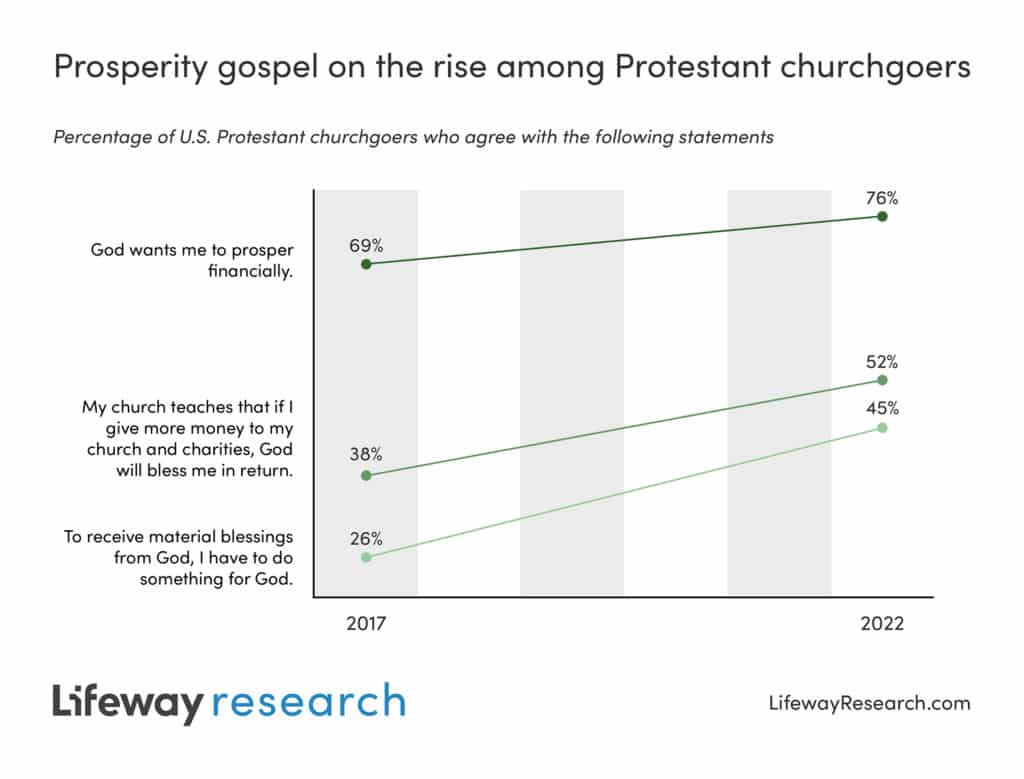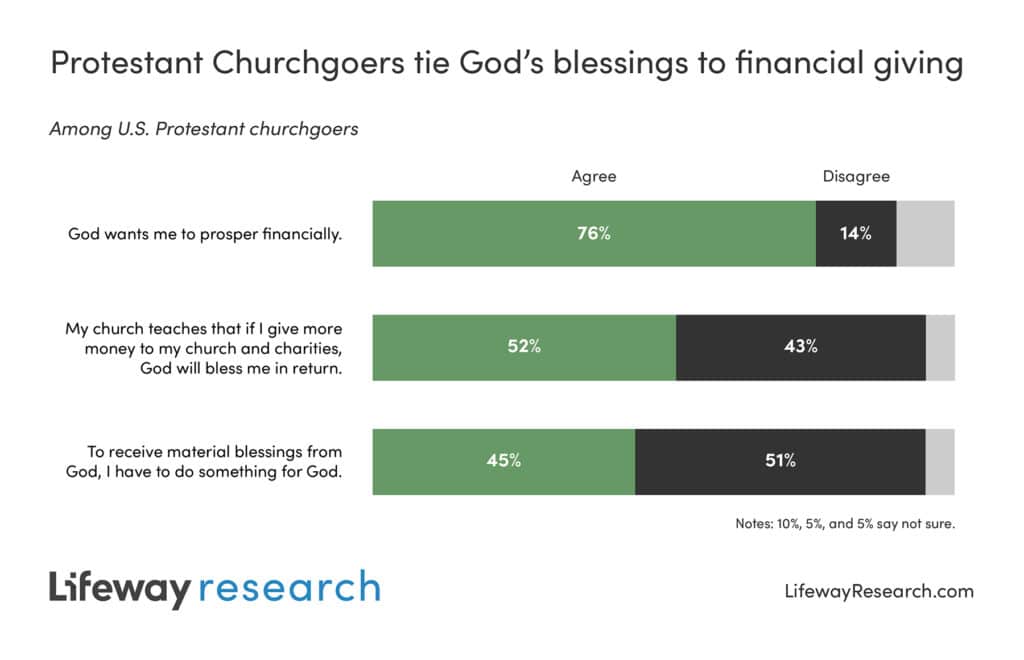A study from Lifeway Research finds 52% of U.S. Protestant churchgoers say their church teaches God will bless them if they give more money to their church and charities. (Photo: TRR graphic)
Financial prosperity is a goal for many Americans, and most believe it’s God’s plan for them too but that they need to give a little more to ensure that blessing.
According to a study from Lifeway Research, 52% of American Protestant churchgoers say their church teaches God will bless them if they give more money to their church and charities, with 24% strongly agreeing. This is up from 38% of churchgoers who agreed in a 2017 Lifeway Research study.
Additionally, churchgoers are more likely today than in 2017 to believe God wants them to prosper financially (76% v. 69%) and that they have to do something for God in order to receive material blessings from Him (45% v. 26%).
Today, 3 in 4 churchgoers (76%) believe God wants them to prosper financially, including 43% who strongly agree. Fewer (45%) believe they have to do something for Him in order to receive material blessings from God, with 21% strongly agreeing.
“In the last five years, far more churchgoers are reflecting prosperity gospel teachings, including the heretical belief that material blessings are earned from God,” said Scott McConnell, executive director of Lifeway Research. “It is possible the financial hits people have taken from inflation and the pandemic have triggered feelings of guilt for not serving God more. But Scripture does not teach that kind of direct connection.”
Give a gift of $30 or more to The Roys Report this month, and you will receive a copy of “Nervous Breakthrough: Finding Freedom from Fear and Anxiety in a World That Feeds It” by Christy Boulware. To donate, click here.

Identifying the root of the wrong belief
As people interact with the world around them, their beliefs about the world and their place in it stem from their understanding (or misunderstanding) of the character of God. And most churchgoers believe God wants them to prosper financially.
This belief is especially prevalent among the youngest, least educated churchgoers. Churchgoers ages 18-34 (81%) and 35-49 (85%) are among the most likely to say God wants them to prosper financially. Furthermore, those who are high school graduates or less (81%) or have some college education (80%) are more likely than those with a bachelor’s (67%) or graduate degree (65%) to hold this belief.
Belief that God wants people to prosper financially is also more common in some religious settings than others. Methodist (93%) and Restorationist movement (88%) churchgoers are among the most likely to hold this belief. And those with evangelical beliefs are more likely than those without such beliefs to agree (80% v. 74%).
“Pursuing holiness was never designed by God to be a plan for financial riches,” McConnell said. “The size of one’s finances is not the measure of anyone’s service to God nor relationship with Him.”
Selling a false gospel at church
As more churchgoers affirm prosperity gospel beliefs, younger churchgoers—those 18-34 (63%) and 35-49 (66%)—are more likely than older churchgoers—those 50-64 (53%) and over 65 (31%)—to affirm their church teaches that if they give more money to the church and charities, God will bless them.
“This research does not rule out the possibility that biblical teachings were poorly heard by more young adults, but they definitely have experienced a lack of clear biblical teaching on the reason for generosity,” McConnell said.
African American churchgoers are the most likely to say their church teaches that if they give more money to the church and charities, God will bless them in return (71%). And those who attend worship services one to three times a month are more likely to say the same than those who attend at least four times a month (57% v. 49%).
Churchgoers without evangelical beliefs are more likely than those with such beliefs to say their church teaches that if they give more money, God will bless them (55% v. 48%). The opposite was true five years ago when 41% of evangelicals agreed and 35% of non-evangelicals agreed.
Denominationally, Methodist (85%) and Restorationist movement (71%) churchgoers are among the most likely to agree their church teaches God will bless them if they give more money.

Giving a little to get a little
Of the three beliefs surveyed, churchgoers are least likely to believe they have to do something for God in order to receive material blessings from Him. Still, like the others, this belief is most prevalent among younger churchgoers. Those 18-34 (65%) and 35-49 (58%) are more likely than those 50-64 (43%) and over 65 (22%) to hold this belief. In 2017, churchgoers ages 35-49 were the least likely age group to agree (19%).
“Scripture teaches God gives good gifts to those He chooses,” McConnell said. Despite Romans 11:35-36a saying “And who has ever given to God, that he should be repaid? For from him and through him and to him are all things” (CSB), McConnell noted, “Large numbers of young adults attending church regularly still believe their good deeds can tilt God’s gifts in their direction.”
Those who are high school graduates or less (50%) or have some college education (48%) are more likely than those with a bachelor’s degree (38%) or a graduate degree (30%) to agree. And African Americans are the most likely to agree (65%).
Among regular church attenders, those who attend a worship service least often (one to three times a month) are more likely than those who attend at least four times a month to say they have to do something for God in order to receive material blessings from Him (49% v. 42%). Methodist (85%) and Restorationist movement (68%) churchgoers are once again the most likely to hold this belief. And those without evangelical beliefs are more likely than those with such beliefs to agree (50% v. 37%).
This article originally appeared at Lifeway Research.
Marissa Postell Sullivan is the managing editor for Lifeway Research.
GET EMAIL UPDATES!
Keep in touch with Julie and get updates in your inbox!
Don’t worry we won’t spam you.
The Roys Report seeks to foster thoughtful and respectful dialogue. Toward that end, the site requires that people register before they begin commenting. This means no anonymous comments will be allowed. Also, any comments with profanity, name-calling, and/or a nasty tone will be deleted.
Comment Policy
The Roys Report seeks to foster thoughtful and respectful dialogue. Toward that end, the site requires that people register before they begin commenting. This means no anonymous comments will be allowed. Also, any comments with profanity, name-calling, and/or a nasty tone will be deleted.

Source: Survey: Prosperity Gospel Beliefs on the Rise Among Churchgoers

16 thoughts on “Survey: Prosperity Gospel Beliefs on the Rise Among Churchgoers”
I have been rich and I have been poor, and from experience I can tell you that rich is much better!
Poverty is a curse. Read Deuteronomy 28 and then say that God wants any of his children to be poor. I am above and not beneath; I am the head and not the tail. Verse 11: “And the Lord will grant you plenty of goods, in the fruit of your body, in the increase of your livestock, and in the produce of your ground…the Lord will open to you His good treasure, the heavens, to give you the rain to your land in its season, and to bless all the work of your hand.”
These blessings of obedience were for those under the Law. Think how much more God wants to bless us who are under a better Covenant of Grace.
Poverty is a test for those of us who aren’t in need. Will we help or hoard? Will we be humbled or look at those in need as “cursed”?! Ugh!
Simon tried to buy the Holy Spirit too. Money certainly doesn’t make a person closer to God. It often is in fact a stumbling block.
Sowing and reaping covers every aspect of Christianity.The poverty=spirituality belief is just as bad as “God wants all to be a billionaire.” Find the balanced middle ground.“Prosperity Gospel” is one of the biggest straw men in Christianity, which very few believe in as typically overstated.
Prosperity is stated over 70 times in the Bible, and no it doesn’t mean just a spiritual value.
Study out the Hebrew shalom, which covers all aspects of life, family, crops, jobs, whatever. And yes there will be challenges, but we pray through every challenge and God can be depended upon to hear the cries of his children.
So sad, that so many have fallen for the lies coming from church pulpits.
Mathew 9:12-13
“Jesus answered them, “It is not the healthy who need a doctor, but the sick. I have not come to call the righteous, but sinners to repentance.”
Luke 5:31-32
“On hearing this, Jesus said to them, “It is not the healthy who need a doctor, but the sick. I have not come to call the righteous, but sinners.”
Mark 2:17
I thank God for his way for those of us not born into privilege.
I don’t think Christian’s realize how their professions of being blessed sounds sometimes. I had a young Christian neighbor offer to help me with a heavy package. As she was carrying it up my steps she told me me how blessed she was to have a husband to carry heavy things for her
Then another teaching pastor claimed money was tight, and he and his family couldn’t take a vacation. Then, because of the amount of money he gives the church, he was offered the use of a timeshare for a week, free of charge.
Coincidentally, I was offered the use of a timeshare, free of charge. (Thanks, Mark.) I thought about it, and I really wanted to go, but decided I couldn’t, unfortunately. But Jesus didn’t owe this to me.
Attributing blessings, in one of the richest countries in world history, to things Jesus owes you is totally and completely Satanic. And I reject it completely.
The Roys Report seeks to foster thoughtful and respectful dialogue. Toward that end, the site requires that people use their full name when commenting. Also, any comments with profanity, name-calling, and/or a nasty tone will be deleted.
Comments are limited to 300 words.
Leave a Reply